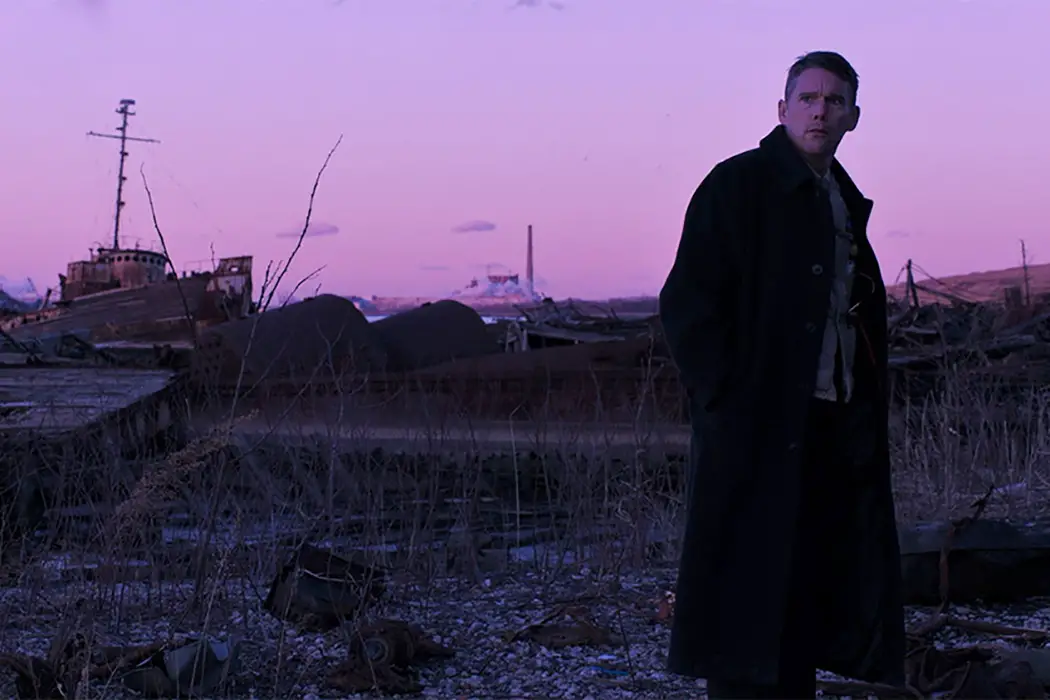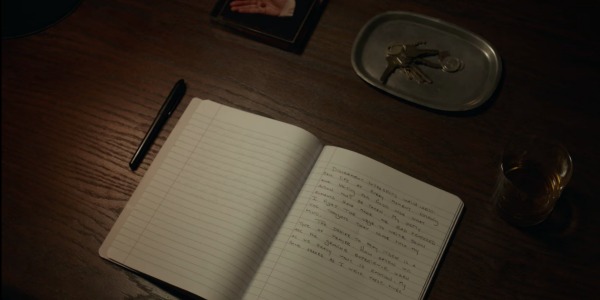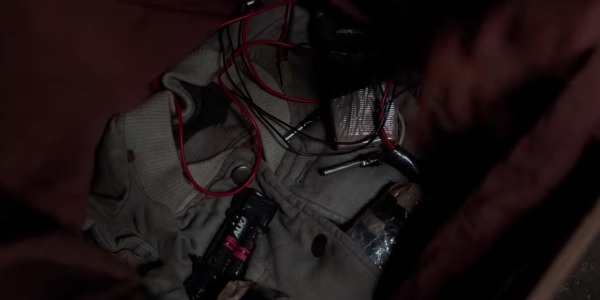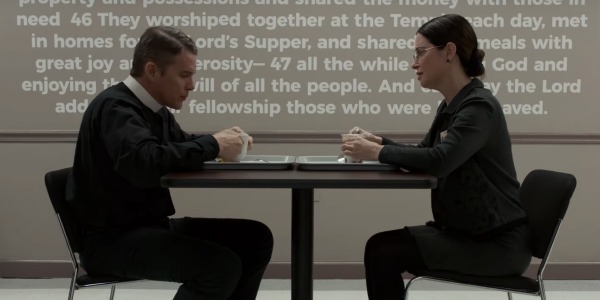SFIFF Review: FIRST REFORMED: The ‘Taxi Driver’ Of The Millennial Generation

Alex Arabian is a freelance film journalist and filmmaker. His…
“Courage is the solution to despair.”
In a Q&A at Rotterdam Film Festival this year, writer and director Paul Schrader noted that, while editing his latest masterpiece, First Reformed, he noticed many similarities to Taxi Driver, a film he famously wrote 42 years ago. Indeed, First Reformed bears many similarities to Taxi Driver, but in the best ways possible.
First Reformed is a meditative, thought-provoking masterwork by a veteran filmmaker who appears to be at the top of his game after nearly half of a century in the film industry. The film brings the biggest issues in our world to the forefront of its story without making it feel the least bit impersonal. It focuses on personal loss and tragedy, while disquietingly highlighting the tragedies and harsh realities that we as a world are faced with every day. It focuses on the will to survive versus the will to give up in the face of adversity. This story confronts the uncomfortable, but it does so fluidly and with tact.
Toller And His Shortcomings
Reverand Toller (played exceptionally by Ethan Hawke) of the First Reformed Church begins a project. He is a former military chaplain who encouraged his son to enlist in the military. Subsequently, his son died in Iraq. Toller puts on a brave front, but still suffers from his son’s death, so he drinks heavily. However, this is ill-advised, as he suffers from some form of advanced cancer. He decides to write longhand in a diary for a year.
As Toller writes, the viewer is exposed to his inner thoughts and confessions, oftentimes similar, albeit more reserved, to those of Travis Bickle’s. Since the death of his son and the decomposition of his marriage, Toller hasn’t been able to communicate to people very well. Most importantly to him, he can’t communicate to god; he can’t pray.

Prayer is a recurring motif in First Reformed. Toller insists that his journal is a form of speaking, a form of prayer. Every connection he tries to make seems off-kilter and everyone who tries to connect with him fails because of his increasingly mean nature and brutal honesty, except for Mary (played amazingly by Amanda Seyfried).
Toller begins acting increasingly peculiar as he becomes sicker; he uncharacteristically tells off his former lover and church member Esther (Victoria Hill), and can’t seem to find any middle ground with the younger generation anymore. He claims they are living in a different world, one marked by intense, blind nationalism, racism, social media communication constructs, global warming; to them, everything is an extreme, one way or the other. In Toller’s eyes, they are entirely overwhelmed and seemingly hopeless.
An Environmentalist Undertone
Reverend Toller strikes up a meaningful friendship with Mary, a pregnant environmentalist. Mary and her husband, Michael (Philip Ettinger), belong to an extremist environmentalist group. Products of the millennial generation, they lean on the pessimistic side of things. Particularly Michael, who believes that bringing a child into this world is wrong because it is unsalvageable.
Upon first meeting in First Reformed, Toller and Michael begin a long, captivating dialogue about the ethics of energy consumption, consumerism, and the systematic depletion of the world’s natural resources for humankind’s benefit and whether or not god can forgive us for destroying this world that “he” created.
Michael commits suicide, sending Toller into a further downward spiral. His journal entries grow more and more unsettling, as does his demeanor. He begins to embrace Michael’s plight. “Can god forgive us for what we’ve done to this world?” he writes in his journal. Mary is his only respite as he goes through this existential hell. Together, they have to cover up Michael’s involvement in the environmental extremist group after they discover a suicide vest. Unbeknownst to Mary, Toller takes the vest. What will he do with it?

What pushes Toller over the edge is when he starts to realize that BALQ, a giant energy conglomerate, responsible for funding First Reformed Church, is also part of the problem Michael was referring to. He discovers that BALQ was also responsible for dismantling several Environmental Protection Agency (EPA) regulations. What ensues in First Reformed is a tense exercise in fear, misunderstanding, and hopelessness. As Hawke‘s Toller proclaims, “By thy words you shall be justified, and by thy words you shall be condemned.”
One Eye Open And One Eye Closed
In Christianity, discernment is perception in the absence of judgment with a view to obtaining spiritual direction and understanding. Throughout First Reformed, Toller is constantly waiting for god to tell him what to do. He is in a constant state of apprehension and indecisiveness, spurring compounding frustration. Without a decided sense of judgement in his fragile mental state, Toller is headed in a direction of creating further despair in the world than he sees when the answer, love, is right in front of him.
There is a scene in First Reformed during which Reverend Toller and Mary are sitting on her couch. Toller sits below an art moulding of an open eye. However, on Mary’s side, there is no eye. This is a reference to Linda J. Flarisee‘s novel, One Eye Open and One Eye Closed. In the book, a preacher’s wife lives in silent depression, learning survival skills by being emotionally isolated while sitting in church.
This is at equal parts a reference to Toller’s ex wife’s depression and Toller’s quiet suffering; he is isolated not only by his life circumstances, but by his status as a reverend, by his church. Through the preacher’s suffering in Flarisee‘s novel, she learns the four principles of life: love god, love your family, love your church, and love people, four recurring themes that Schrader plays with in First Reformed.
Bringing The Technical Goods
First Reformed begins with an extended black screen and pure silence. Slowly, the painstakingly symmetrical picture fades in of the First Reformed Church and the silence is washed out by the white noise elicited by the graveyard surrounding the church. Immediately, Schrader lets the audience know that this film will be a slow burner; it is a sign that First Reformed will take its precious time. Not soon after, we find out why – the language in this film is magnificently poetic.
Schrader‘s direction is marvelous, meticulous, and nuanced. Almost every major shot is framed perfectly symmetrically. There is no flashy CGI, just wonderful natural lighting and a steady hand. Other than that, First Reformed is story-driven, and what a story it is. Schrader‘s writing is as profound as it was four decades ago, even more so considering the sociopolitical climate of today. He even incorporates magical realism into First Reformed, and beautifully so, I might add.

At one point during the film, Reverend Toller and Mary engage in an intense embrace, after which Schrader visually transports the audience to space, then to various beautiful areas of the world across different continents, geographies, and topographies, all seemingly untouched by human beings. Schrader is conveying Flarisee‘s theme that loving people is one of the principles of life by showing us that human connection transcends space and time.
Cinematographer Alexander Dynan, who worked with Schrader on Dog Eat Dog, graces the film with incandescent cinematography. The lighting is ephemerally ethereal; Dynan doesn’t overwhelm with majestic, cathartic shots and god-like, religious imagery. But when those shots do come around, it’s simply breathtaking to see onscreen. Dynan is truly a magician behind the camera.
First Reformed: Conclusion
Contrary to how the film began, aesthetically, First Reformed ends abruptly as if to put a sudden halt to Toller’s unnerving plight before it becomes a tragedy. One might notice that there seems to be no score in First Reformed. And though it may seem this way, there is a very minimalistic score in the background; Brian Williams concocts a faint hum that appears in the subconscious, but not a consistent one. The consistency in this film is provided by Schrader‘s persistent, poignant dialogue delivered poetically by Hawke and his supporting cast.
Don’t miss Schrader‘s umpteenth capolavoro, First Reformed. A trio of staggering performances by Hawke, Seyfried, and Cedric the Entertainer in a breakout dramatic roll, a gripping story that mines our current sociopolitical landscape for philosophical fodder, and typically formidable writing make First Reformed a mandatory watch for anyone and everyone.
Are you excited to see First Reformed? What is your favorite Ethan Hawke performance? Do you enjoy slowly-paced films?
First Reformed will be released theatrically in the U.S. on May 18, 2018. For more information on its release, click here.
Does content like this matter to you?
Become a Member and support film journalism. Unlock access to all of Film Inquiry`s great articles. Join a community of like-minded readers who are passionate about cinema - get access to our private members Network, give back to independent filmmakers, and more.
Alex Arabian is a freelance film journalist and filmmaker. His work has been featured in the San Francisco Examiner, The Playlist, Awards Circuit, and Pop Matters. His favorite film is Edward Scissorhands. Check out more of his work on makingacinephile.com!












